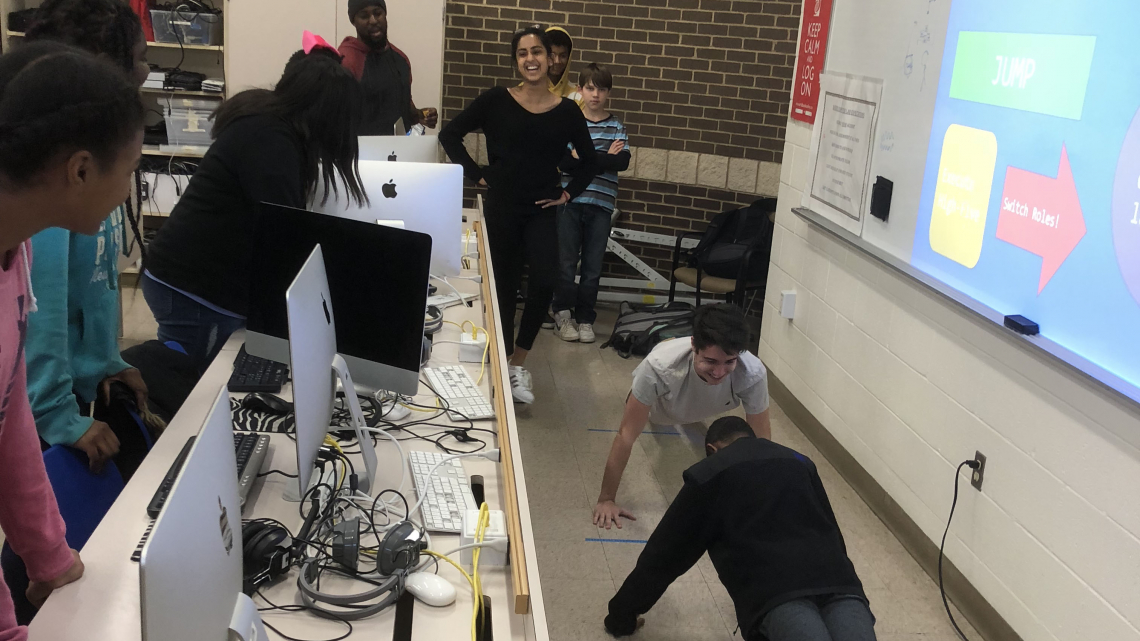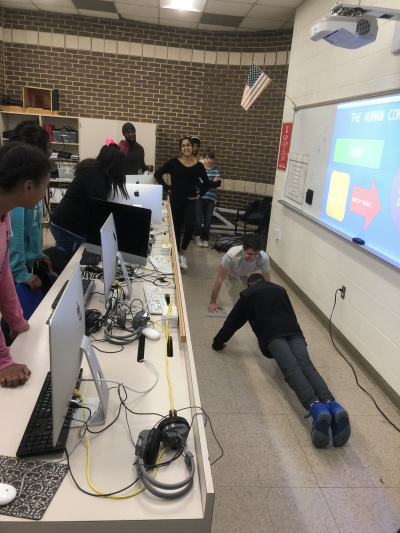
Duke Undergrads Lead Middle Schoolers in Developing Mobile Apps

Editor's note: This article, contributed by Lee Adi, Hayley Barton, Tanner Johnson, Nick Turecky, and Carter Zenke, provides an update on Mobile Citizens, an after-school program developed by Duke students to bring computer science to low-income middle schoolers, which was reported on in a 2017 article in The Chronicle.
A sense of ethics and community-oriented service are not graduation requirements for a computer science (CS) degree. But in a world becoming more digital - where CS touches everything and everyone - they must be.
As an after-school program that enables Durham middle school students to build mobile apps for their communities, Mobile Citizens serves those students, but our aspirations don’t stop there. We also want to reimagine CS education for us undergraduates. As everyone who has played an integral part in Mobile Citizens can attest, the experience is transformative. No longer is CS just about minimizing time complexities and memory usage. It becomes a tool for maximizing positive impacts on real lives,like Hayley Barton, Tanner Johnson, Carter Zenke, Lee Adi, and Nick Turecky will elaborate on further.
Hayley: The four members of my group have a quirky and intense interest in fashion, especially shoes. While this excitement is stifled in many of their other classes due to academic pressures, Mobile Citizens encourages and harnesses this enthusiasm by allowing them to create a fashion app. The students are curious and genuinely enjoy learning how to use our app development program, AppLab, because it allows them to showcase their passion for fashion in a fun and novel way.
Now that we are in the development stage of our project, my group has been digging deeply into our app and learning by doing. Last week, I watched one student fill in another who had been absent about how to make an app interactive using buttons. They both boasted huge smiles as they connected two screens of the app featuring different fashion designers. In addition to learning about CS concepts, students learn how to work in groups, brainstorm, and think about the big picture, all crucial skills in the 21st century that they will surely rely on in their future lives and careers.
Tanner: I think we underestimate kids. When I first started mentoring students in Mobile Citizens, I’ll admit I was skeptical about a group of middle schoolers creating functional mobile apps in 10 weeks. Maybe my doubts reflected some pride as a CS student at Duke who has struggled through my fair share of programming assignments and app design. Ideating creative, meaningful apps is hard stuff. How would kids do it if I’ve struggled?
Allow me to introduce team Treat Yo’ Self. Ever feel like you need some productive downtime? Well, this team’s got your back. After our Big Brainstorm, these four contagiously effusive coders agreed that they each love learning and teaching, and realized they have unique skills they want to share with their community. Treat Yo’ Self is the new hub for learning basic coding, healthy recipes, singing, and baking. As a mentor, I’m a supporter and adviser, but they are the drivers of their work. Beyond coding and design, they also have an impressive knack for business modeling – our ‘baking’ lead plans to cook some of her recipes and bring them to our end-of-semester WOW! Event, which showcases the apps to the community. After sharing some frutas con chile, she’ll guide community members to the app so they can recreate her recipe at home. It’s about time we let students exert their creative agency outside the box of traditional pedagogy. And if I haven’t already made this clear: these coders are in middle school.
Carter: Last semester, calling ourselves the Cheftastic! team, I assisted two middle schooler students to build an app that shared healthy recipes and pro-tips to be a Chef Cuisinier with families and teachers in Durham. Our app is a testament to the way CS can be a tool of positive change. There are in fact 3 beneficiaries in this exchange: the users of our app, those in our team who became passionate about coding for the first time, and myself who realized you don’t truly “know” CS until you can share it with others.
In the future, we want all Duke CS students to know their field in this way.
Lee: My basis for joining Mobile Citizens was to expand the impact of CS. This impact has taken the form of Beauty Hub for the group that I am currently working with. This group of creative and innovative students aims to assist uninformed individuals in everything and anything beauty related. Within their four categories of hair, makeup, nails, and fashion, the group has researched beauty hacks and tips to integrate into their app. Initially, they were more eager to research, but, week by week, they felt more confident and excited about coding. Last week, one group member who was struggling with coding for a button to move to a new page finally understood the function “SetScreen.” By starting off her sentences with “on the event that…” this learner even began talking out the code as she completed it.
Their project goes beyond hair and nails and illustrates what individuals are capable of, so long as they are inspired, challenged, and informed.
Nick: Perhaps one of my biggest regrets of my pre-college education was not taking a CS class. Taking CS classes at Duke made me wish I’d had the opportunity to take similar classes earlier. From working with Mobile Citizen students, I have witnessed how CS empowers them to express themselves in unique and creative ways. My team, the Bracket Busters, is developing a sports trivia app, combining their interests in sports and education. Seeing their passion and progress as they grow from being completely inexperienced coders into a talented group with a new skill set is inspiring.
From sports trivia to fashion designers, it’s clear that Mobile Citizens does not serve one type of student with one type of interest. We believe CS can empower all students to utilize their skill sets to meet a community need, and, with this belief in mind, we built and iterated on Mobile Citizens. Hayley, Tanner, Carter, Lee, Nick, and I want more out of CS than another social media app or more algorithms. We believe CS can be a pathway to a wellbeing for both our students and their communities.




